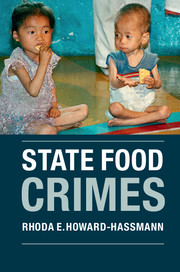Book contents
- Frontmatter
- Dedication
- Contents
- Acknowledgments
- Part I Introduction and Background
- Part II Contemporary Case Studies
- Part III Implications for the International Human Right to Food
- 8 International Law and the Right to Food
- 9 Sticks and Carrots: Sanctions and Food Aid
- 10 Interdependent Human Rights
- 11 Liberal Democracies and the Right to Food
- 12 A New International Treaty on the Right to Food
- Bibliography
- Index
11 - Liberal Democracies and the Right to Food
from Part III - Implications for the International Human Right to Food
Published online by Cambridge University Press: 05 August 2016
- Frontmatter
- Dedication
- Contents
- Acknowledgments
- Part I Introduction and Background
- Part II Contemporary Case Studies
- Part III Implications for the International Human Right to Food
- 8 International Law and the Right to Food
- 9 Sticks and Carrots: Sanctions and Food Aid
- 10 Interdependent Human Rights
- 11 Liberal Democracies and the Right to Food
- 12 A New International Treaty on the Right to Food
- Bibliography
- Index
Summary
The Right to Adequate Food in Liberal Democracies
This book deals specifically with prevention and punishment of state-induced famine, or faminogenesis, especially in North Korea and Zimbabwe. It also discusses severe state-induced malnutrition in the West Bank and Gaza (WBG), and state-induced food shortages in Venezuela. However, it does not discuss policies affecting access to food defined more broadly, especially in democratic market economies.
Yet many individuals are malnourished even in rich, democratic states. Indeed, one might add to Marcus’ four categories of food deprivation presented in Chapter 1 another category, that of neglect. This neglect can be seen, for example, in the extent of food insecurity in Canada and the United States. In Canada in 2011–12, 5.8 percent of households were judged to be moderately food insecure, in the sense that the quality and quantity of their food was compromised, while another 2.5 percent of households were judged to be severely insecure, in the sense that their food intake was reduced (Statistics Canada 2013). In the US in 2013, 13.6 percent of households were judged to have low food security, in the sense that they could “get by” with coping strategies, while 5.9 percent of households were judged to have very low food security, in the sense that their food intake was reduced (Coleman-Jensen et al. 2014). It should surely be of concern that approximately one in twelve Canadian households and one in five American should have suffered from such serious food insecurity.
While I do not adhere to a relativist stance that finds false rights-violating equivalencies between developed democracies and underdeveloped non-democratic states, I do maintain that developed democracies could do a better job of protecting their citizens’ rights to adequate nutrition. One respect in which they fail is by not providing enough welfare – indeed, by more accurately providing “illfare” (Sen 1981, 30) – to those who cannot fend for themselves. Policies and income supports ostensibly to protect the poor often leave them so poverty-stricken that they cannot purchase the food they need after paying their rent and other necessary expenses.
- Type
- Chapter
- Information
- State Food Crimes , pp. 197 - 213Publisher: Cambridge University PressPrint publication year: 2016



